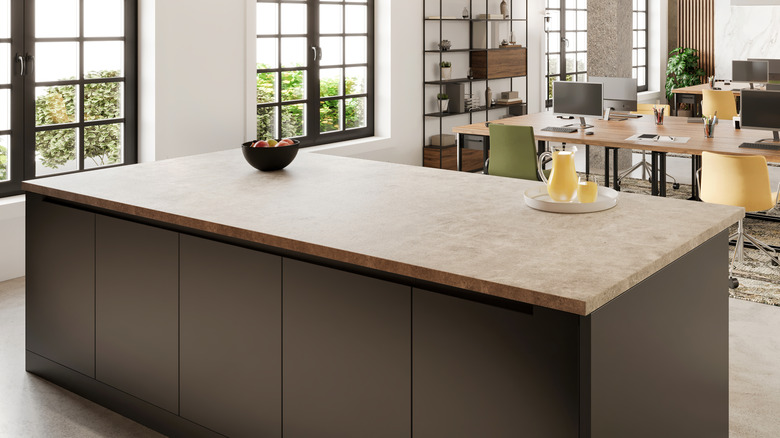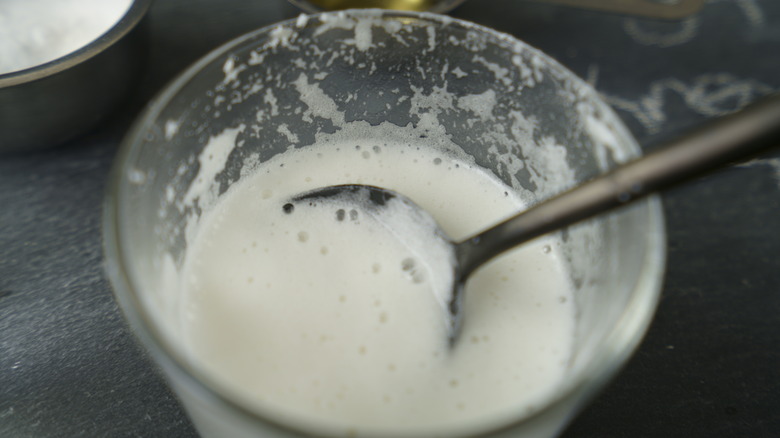Avoid Using These Cleaning Ingredients On Concrete Countertops At All Costs
Putting in concrete countertops is a way to add a touch of rustic elegance to any kitchen. Concrete countertops are rapidly growing in popularity among homeowners thanks to their affordability, their durability, and their sustainability compared to other countertop options. But concrete countertops also come with their own set of challenges, namely care instructions that must be followed to avoid some seriously unsightly damage. We're talking about stunning concrete countertops that can be ruined with one false move with the wrong cleaner.
Now, the last thing any homeowner wants to do is make a simple mistake that mars their concrete countertops, but how can cleaners cause such a problem? That is because concrete countertops, though quite durable, are also susceptible to staining and etching. Staining, in the context of concrete countertops, occurs when substances penetrate the surface, leaving behind unwanted colors and patterns that disrupt the harmonious appearance of your kitchen.
Etching, however, is a much more damaging and harder-to-repair issue. When acidic substances interact with concrete, they can chemically dissolve the cement paste, leaving a rough, dull surface in place of the once-smooth satin finish. Unlike stains, which can often be scrubbed away, etched surfaces require repair — a far more challenging scenario and one that might not be perfect when it comes to restoring the countertop's original beauty. Even simple household cleaners can cause etching; this includes acidic things, like vinegar and lemon juice, and basic chemical cleaners such as bleach.
What damages concrete countertops?
Let's dive in a bit more on what common kitchen cleaners might possibly damage your concrete countertops. First on the list are most acidic substances, such as vinegar or lemon juice. These everyday kitchen staples can cause serious etching issues when it comes to concrete.
How and why? Well, because acidic cleaners naturally eat into the concrete. They do this by chemically dissolving the paste that binds all the ingredients together, creating pitting and rough damage that not only looks bad but is rough on your hands and creates more porous space for bacteria to grow in. Bleach and harsh chemicals that can often be found in stronger cleaners are similarly brutal and may even damage any sealer applied on the surface, thus compromising the concrete's resilience further. Even some cleaners that label themselves as "safe" but contain mild acids can inflict lasting damage, so make sure you pay attention to any and all labels.
It is also important to remember that even reputable sealers, particularly acrylic ones, might not be enough to prevent damage from etching in the face of these cleaners. Instead of a simple cleaning, you might find yourself knee-deep in repairing your countertops instead, filling those new gaps with grouts that never quite match the original look. Instead, make sure you only use "safe" cleaners, aka those that won't cause etching and staining.
What should you use to clean concrete countertops?
Knowing what to avoid is important, but what about what you can use to clean concrete countertops? The first duo that you should reach for is a simple mix of warm water and mild dish soap. This gentle combination is really good at removing most stains without being either acidic or abrasive. Simply mix a couple of teaspoons of dishwashing liquid, such as Dawn, into a container of warm water, dip a cloth into the mix, and gently scrub away the stains, repeating if the stain remains stubborn.
A hydrogen peroxide mix may be necessary to cut through tougher stains in your kitchen. Combine one or two tablespoons of hydrogen peroxide with a cup of flour and enough water to form a paste. Cover the stain with this paste and let it sit; then, after a few hours, wipe it off with a damp cloth while scrubbing, and you should have a much cleaner space without the threat of etching.
Finally, pH-balanced wipes or cleaning agents specifically formulated for concrete countertops are important additions for regular maintenance. These products are crafted specifically to make sure you get effective cleaning without risking damage, allowing you to uphold both cleanliness and integrity daily. Remember, prevention and regular care trump any extensive post-damage restoration efforts. By selecting suitable cleaning methods, you ensure that your countertop — an investment in both style and function — remains a pristine and functional centerpiece in your kitchen for years.


